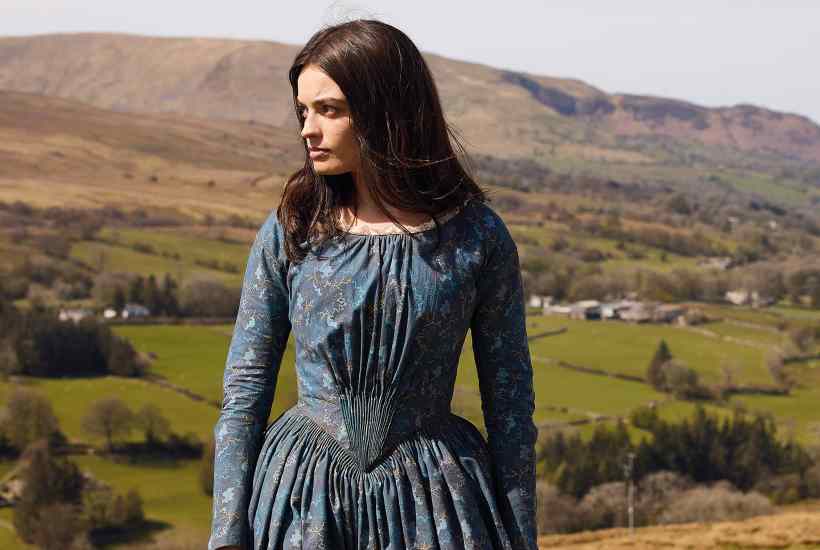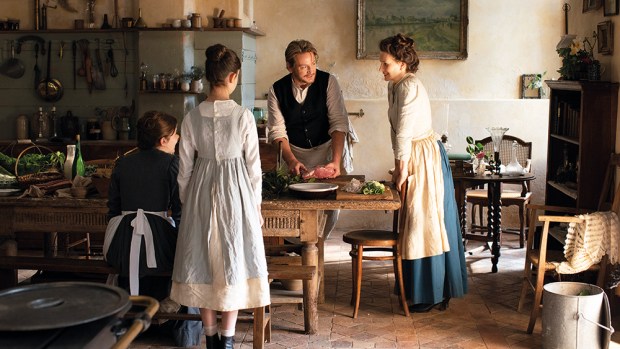The life of Emily Brontë is an enduring object of fascination. So small, the life, so sparse, so limited. Yet it delivered those magnificent poems and Wuthering Heights. How could this be? Genius, I suppose, paired with a vivid interior life. But as neither of those are cinematic, Emily imagines what could have led her to write as she did. It’s a ‘speculative biopic’, and modern, but there’s no Billie Eilish on the soundtrack or breaking of the fourth wall or jokey intertitles or any of those larks, which is a mighty relief. Instead, it’s daring, and ravishing. If you’d asked me if Emily might have ever tried opium, or had a passionate affair with a sexy curate, I’d have laughed in your face. But here I absolutely bought it.
It’s actor Frances O’Connor’s first time behind the camera yet there is nothing tentative about this film. Emma Mackey, from Sex Education, stars as Emily, turning in a performance so ferocious it will put you in mind of Florence Pugh in her breakout film, Lady Macbeth. It has that same raw, powerful energy. The film opens with Emily, who died at 30, on her deathbed as her younger sister, Anne (Amelia Gething), is asking her: ‘How did you write it? How did you write Wuthering Heights? It’s an ugly book and base and full of selfish people.’ ‘Good,’ replies Emily. Anne doesn’t much figure in the film after this, but then Anne never much figures. (Poor Anne.)
 Left to right: Anne (Amelia Gething), Charlotte (Alexandra Dowling) and Emily Brontë (Emma Mackey) in Emily. Credit: © Michael Wharley/Popara Films Ltd
Left to right: Anne (Amelia Gething), Charlotte (Alexandra Dowling) and Emily Brontë (Emma Mackey) in Emily. Credit: © Michael Wharley/Popara Films Ltd
We spool back in time to when the parsonage at Haworth was populated by Emily, Anne, Charlotte (Alexandra Dowling), Branwell (Fionn Whitehead), their father (Adrian Dunbar) and their aunt (Gemma Jones). Emily is the weirdest of the weird sisters, known in the village as ‘the strange one’. She’s a loner. She doesn’t mix. She feels alienated from her family but finds solace with them. She travels to Brussels, when it’s thought she will be a teacher, but almost immediately returns home. That’s as far she gets. Brussels. ‘I’m an odd fish,’ she says. ‘Take me away and I fade away.’ But she has her imagination, and the stories she makes up with her sisters – although Charlotte thinks they are too old for that now – and she has the moors, where she can run wild, sometimes as rain pours and thunder claps and the violin soundtrack by Abel Korzeniowski goes berserk. The film has madly Gothic moments, of course.
Emily is closest to her brother, Branwell, who is always disgracing the family, one way or another. But he has the firmest grasp on what makes his sister tick, and how they are both restricted by convention. She discovers his opium stash and has a try. She is dispatched to fetch him from the pub and returns drunk herself. This sounds insane on paper – Emily Brontë, drunk! And high! – but set within the film’s internal logic it makes sense. She also falls passionately for William Weightman (Oliver Jackson-Cohen), a curate, but they are doomed, plus there is one of those letters that is read too late. Emily learns that love can be cruel, and violent, and vengeful, which will all be poured into the book Anne hates.
This is presented as a series of vignettes, filmed mostly in natural light and with hand-held cameras so, while the times may have been constrained, the characters aren’t. There are some deliciously beautiful visual moments as well as some funny ones. (Emily bakes a very bad cake at one point.) And Mackey is superb, able to convey her bafflement at the world, as well as her deep attachment to it, with just a flicker of an eye or the set of her jaw. It is one of those films that is better than anyone can ever make it sound.
Got something to add? Join the discussion and comment below.
Get 10 issues for just $10
Subscribe to The Spectator Australia today for the next 10 magazine issues, plus full online access, for just $10.
You might disagree with half of it, but you’ll enjoy reading all of it. Try your first month for free, then just $2 a week for the remainder of your first year.














Comments
Don't miss out
Join the conversation with other Spectator Australia readers. Subscribe to leave a comment.
SUBSCRIBEAlready a subscriber? Log in